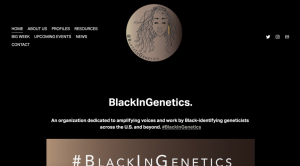Theme: Genetics
Back to Top
|
 |
|
Teaching Genetics with Dragons
|
Science |
|
Forget boring Punnett square diagrams and embrace the challenge of distilling complex genetics content into understandable and enjoyable lessons with some help from Teaching Genetics with Dragons. Readers can add some fire to genetics lessons with this platform that uses mythical creatures as a launching point for scientific discovery. Though dragons and genetics may not be an obvious pair, these games prove that creativity is boundless. Three games are available: Geniventure, Geniverse, and Genigames. The Summary of Features table on the landing page compares each game, noting the appropriate grade level, topics covered, length of curriculum, and other key features. The games share a core theme, teaching players about phenotypes, genotypes, meiosis, gametes, inheritance, and other aspects of genetics. Readers should note that the games are most compatible with recent versions of Google Chrome, Safari, Firefox, Internet Explorer, and Microsoft Edge web browsers. Additionally, users will have to create a free account to play. Teaching Genetics with Dragons is a project of The Concord Consortium, a nonprofit educational research and development organization, and is supported by the National Science Foundation. [EMB] |
|





|
|
 |
|
G3
|
Science |
|
G3 covers three important, and interrelated, topics: genes, genomes, and genetics. A project of the Genetics Society of America, the journal publishes open-access scholarship under a Creative Commons Attribution License. While the journal centers on genetics, it strives to publish work that will draw the attention of multidisciplinary scholars, from biology to mycology to botany. G3 is also notable for its publishing frequency, with 12 issues released each year. Readers can browse the journal's content on the Issues tab. Though it will automatically pull up the latest issue, filters at the top of the page allow readers to sort by year and volume (2011-present). The right-hand panel also has links for readers to sign up for email alerts, follow RSS feeds, and view the "most read" and "most cited" articles. Researchers interested in publishing with the journal will find relevant guidelines and policies on the Submit tab. Brenda Andrews (University of Toronto) serves as the journal's current editor-in-chief. [EMB] |
|





|
|
 |
|
Black in Genetics
|
Science |
|
Black in Genetics is on a mission to disseminate scientific knowledge and dismantle racism within the field. The organization connects Black geneticists to employers and resources and also provides a space for conversation on advancing equity. To advance the first goal, the group launched a job board that highlights world-wide employment opportunities. The site also posts short biographies of Black geneticists, genetic counselors, educators, and other members of the field, creating opportunities for mentorship and visibility. Additionally, readers will find information about the group's events. For example, in August 2020 the organization launched a week-long series of programming, #BlackInGeneticsWeek, to "celebrate both Blackness and the wonderful field of Genetics." The work to amplify Black geneticists continues on social media platforms and users can find @BlackInGenetics on both Twitter and Instagram. Black in Genetics is led by its founder, Alexis Stutzman (a PhD Candidate in Genetics and Molecular Biology Curriculum at University of North Carolina Chapel Hill) and its President, Markia Smith (a PhD Student in Pathobiology and Translational Science, also at the UNC Chapel Hill). [EMB] |
|





|
|
 |
|
 |
|
Genetics Unzipped
|
Science |
|
Produced by the Genetics Society, recognized as "one of the world's oldest 'learned societies,'" Genetics Unzipped is a wonderful resource for science podcast fans. Dr. Kat Arney hosts the show, and her skills as an award-winning science writer shine as she "unzips" complex genetics topics for listeners outside of the field. With three seasons (totaling more than 75 episodes and counting), the show has tackled everything from cancer cells (see the "Genetics Shambles 5: The evolution of cancer" episode) to creating comfortable research studies (see the "Nothing About Me Without Me" episode). Perhaps, in honor of International Women's Day earlier this week, readers will want to check out the March 2019 episode, "Not just the wife," which celebrates four incredible women scientists. Or, those eagerly awaiting St. Patrick's Day may enjoy the December 2019 episode, "The genomic history of Ireland," a short piece discussing geography and genomes with Dr. Lara Cassidy from Trinity College Dublin. A more recent episode, "100 not out?" offers tips on aging and health (spoiler: a toothbrush is perhaps the most underrated anti-aging product). Whatever episode listeners fancy can be found at the link above and on their preferred podcast platform. [EMB] |
|





|
|

















